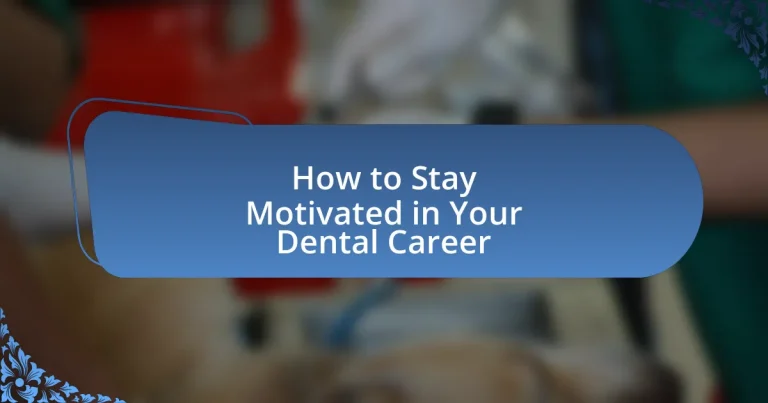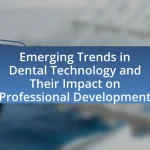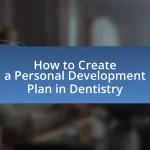The article focuses on strategies for maintaining motivation in a dental career, emphasizing the importance of personal and professional growth. It discusses the significance of motivation in enhancing job performance, patient care, and overall job satisfaction while addressing common challenges such as stress and burnout. Key topics include the impact of goal-setting, continuous education, and supportive work environments on motivation levels, as well as the role of patient interactions and work-life balance. Additionally, the article highlights practical tips, resources, and the benefits of mentorship programs to help dental professionals sustain their motivation and achieve long-term career success.
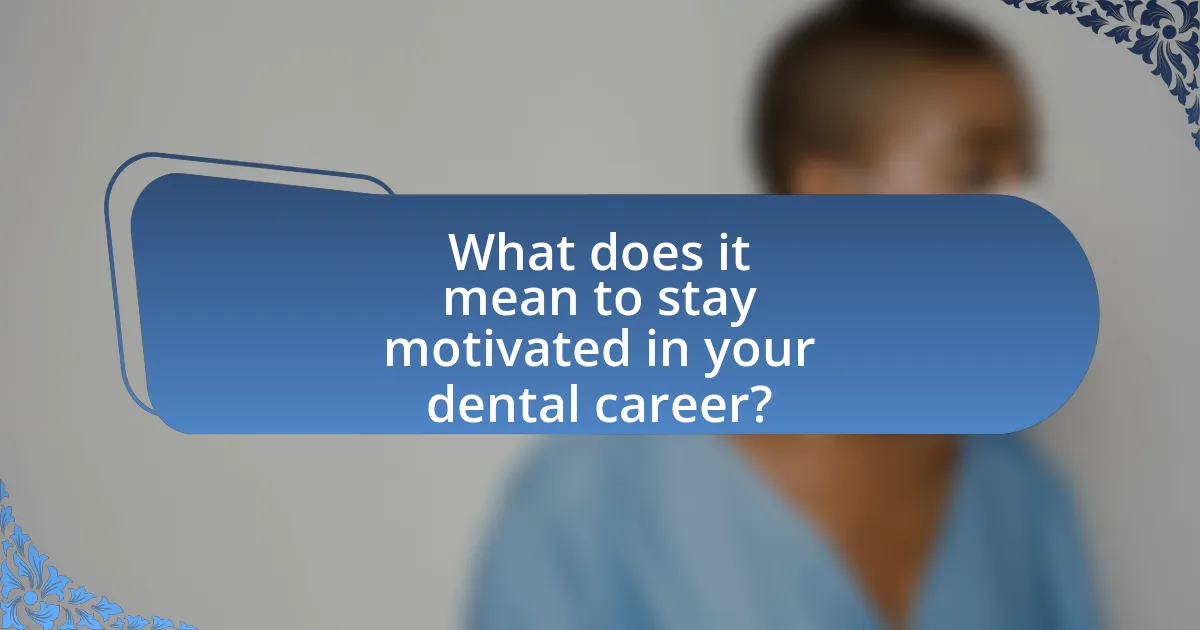
What does it mean to stay motivated in your dental career?
Staying motivated in your dental career means maintaining a strong commitment to personal and professional growth while actively engaging in your work. This involves setting clear goals, seeking continuous education, and finding fulfillment in patient interactions. Research indicates that dental professionals who pursue ongoing training and development report higher job satisfaction and lower burnout rates, highlighting the importance of motivation in enhancing career longevity and effectiveness.
Why is motivation important in the dental profession?
Motivation is crucial in the dental profession because it directly influences the quality of patient care and the overall success of dental practices. Motivated dental professionals are more likely to engage in continuous learning, adopt innovative techniques, and maintain high standards of care, which ultimately leads to better patient outcomes. Research indicates that motivated practitioners exhibit higher levels of job satisfaction, which correlates with reduced burnout rates and improved patient interactions. For instance, a study published in the Journal of Dental Education found that dental students with higher intrinsic motivation demonstrated superior clinical performance and patient communication skills. This evidence underscores the importance of motivation in fostering a productive and effective dental environment.
How does motivation impact job performance in dentistry?
Motivation significantly enhances job performance in dentistry by driving dentists to deliver high-quality care and maintain patient satisfaction. When dental professionals are motivated, they exhibit increased productivity, improved clinical outcomes, and a greater commitment to ongoing education and skill development. Research indicates that motivated employees are more likely to engage in positive behaviors, such as effective communication with patients and adherence to best practices, which directly correlates with better patient experiences and treatment success rates. For instance, a study published in the Journal of Dental Education found that motivated dental students performed better in clinical settings, demonstrating the direct link between motivation and performance in the dental field.
What are the long-term effects of sustained motivation on a dental career?
Sustained motivation in a dental career leads to enhanced job satisfaction, improved patient outcomes, and increased professional development. When dental professionals maintain high levels of motivation, they are more likely to engage in continuous education and skill enhancement, which directly correlates with better clinical performance and patient care. Research indicates that motivated dentists report higher levels of job satisfaction, which can reduce burnout rates and improve retention in the profession. Furthermore, motivated individuals are more inclined to adopt innovative practices and technologies, ultimately benefiting their practice and patients.
What are common challenges to motivation in dentistry?
Common challenges to motivation in dentistry include high levels of stress, burnout, and the emotional toll of patient care. Dentists often face demanding work schedules and the pressure of managing patient expectations, which can lead to fatigue and decreased job satisfaction. Research indicates that approximately 30% of dentists experience burnout, primarily due to the emotional and physical demands of the profession. Additionally, the repetitive nature of dental procedures can contribute to a lack of engagement and motivation over time.
How do work-life balance issues affect dental professionals’ motivation?
Work-life balance issues significantly decrease dental professionals’ motivation. When dental professionals experience an imbalance between their work and personal lives, they often face increased stress and burnout, which can lead to decreased job satisfaction. Research indicates that 60% of dental professionals report feeling overwhelmed due to work demands, negatively impacting their enthusiasm and productivity. Furthermore, a study published in the Journal of Dental Education found that those with poor work-life balance are more likely to consider leaving the profession, highlighting the direct correlation between balance and motivation.
What role does patient interaction play in a dentist’s motivation?
Patient interaction significantly enhances a dentist’s motivation by fostering a sense of purpose and fulfillment in their work. Engaging with patients allows dentists to witness the direct impact of their skills on improving oral health and overall well-being, which can be a powerful motivator. Research indicates that positive patient relationships contribute to job satisfaction, as dentists often report feeling more motivated when they receive feedback and appreciation from patients. For instance, a study published in the Journal of Dental Education found that dentists who actively engage with their patients experience higher levels of job satisfaction and motivation, reinforcing the importance of these interactions in their professional lives.
How can dental professionals assess their motivation levels?
Dental professionals can assess their motivation levels through self-reflection and structured assessments. Self-reflection involves evaluating personal goals, job satisfaction, and emotional responses to daily tasks, which can reveal intrinsic motivation. Structured assessments, such as the Work Extrinsic and Intrinsic Motivation Scale (WEIMS), provide quantifiable measures of motivation by evaluating both intrinsic and extrinsic factors influencing their work. Research indicates that understanding these motivational drivers can lead to improved job performance and satisfaction, as highlighted in studies on workplace motivation in healthcare settings.
What tools or methods can be used to evaluate motivation in a dental career?
To evaluate motivation in a dental career, tools such as self-assessment questionnaires, performance reviews, and motivational interviewing techniques can be utilized. Self-assessment questionnaires, like the Motivational Assessment Scale, allow dental professionals to reflect on their intrinsic and extrinsic motivators. Performance reviews provide feedback on job satisfaction and engagement levels, while motivational interviewing techniques facilitate open discussions about career aspirations and challenges. Research indicates that structured feedback and self-reflection significantly enhance motivation and job satisfaction in healthcare settings, including dentistry.
How can self-reflection enhance motivation assessment?
Self-reflection enhances motivation assessment by allowing individuals to evaluate their personal goals, values, and progress. This process helps dental professionals identify what drives their passion for their career, leading to a clearer understanding of their intrinsic motivations. Research indicates that self-reflection can improve self-awareness, which is crucial for motivation; a study published in the Journal of Occupational Health Psychology found that increased self-awareness correlates with higher job satisfaction and motivation levels. By regularly engaging in self-reflection, dental professionals can adjust their goals and strategies, ensuring that their motivations align with their career aspirations.
What strategies can help maintain motivation in a dental career?
To maintain motivation in a dental career, professionals should set clear goals, engage in continuous education, and foster a supportive work environment. Setting specific, measurable, achievable, relevant, and time-bound (SMART) goals provides direction and a sense of accomplishment as milestones are reached. Continuous education, such as attending workshops and pursuing advanced certifications, keeps dental professionals updated on the latest techniques and technologies, enhancing their skills and job satisfaction. Additionally, a supportive work environment, characterized by positive relationships with colleagues and open communication, contributes to overall job satisfaction and motivation. Research indicates that professionals who engage in continuous learning and work in collaborative settings report higher levels of job satisfaction and motivation.
How can setting goals improve motivation for dental professionals?
Setting goals can significantly enhance motivation for dental professionals by providing clear direction and measurable benchmarks for success. When dental professionals establish specific, achievable goals, they create a roadmap that helps them focus their efforts and track their progress. Research indicates that goal-setting leads to higher performance levels, as it fosters a sense of purpose and accountability. For instance, a study published in the Journal of Dental Education found that dental students who set personal academic goals reported increased motivation and satisfaction in their studies. This demonstrates that goal-setting not only clarifies objectives but also boosts intrinsic motivation, ultimately leading to improved professional outcomes.
What role does continuing education play in sustaining motivation?
Continuing education plays a crucial role in sustaining motivation by providing dental professionals with opportunities to enhance their skills and knowledge. Engaging in ongoing learning helps individuals stay current with advancements in dental practices, which can reignite passion for their work. Research indicates that professionals who participate in continuing education report higher job satisfaction and motivation levels, as they feel more competent and confident in their abilities. For instance, a study published in the Journal of Dental Education found that 85% of dental professionals who pursued additional training felt more motivated in their careers. This connection between learning and motivation underscores the importance of continuing education in fostering a fulfilling and dynamic dental career.
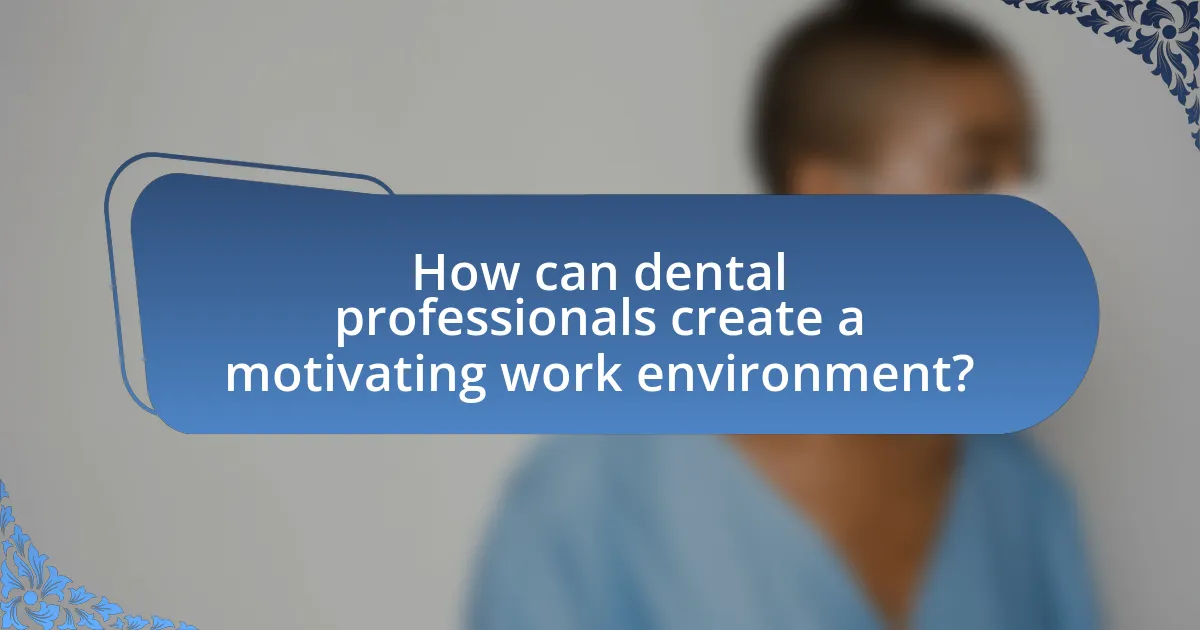
How can dental professionals create a motivating work environment?
Dental professionals can create a motivating work environment by fostering open communication, recognizing achievements, and promoting professional development. Open communication encourages team members to share ideas and concerns, which enhances collaboration and trust. Recognizing achievements, whether through verbal praise or formal awards, boosts morale and reinforces positive behaviors. Additionally, providing opportunities for professional development, such as workshops or continuing education, empowers dental staff to enhance their skills and feel valued in their roles. Research indicates that workplaces with supportive cultures see a 30% increase in employee satisfaction, demonstrating the effectiveness of these strategies in motivating dental professionals.
What elements contribute to a positive workplace culture in dentistry?
A positive workplace culture in dentistry is primarily contributed to by effective communication, teamwork, recognition, and a supportive environment. Effective communication fosters transparency and trust among staff, which is essential for collaboration and patient care. Teamwork enhances efficiency and morale, as dental professionals work together to achieve common goals. Recognition of individual and team achievements boosts motivation and job satisfaction, leading to lower turnover rates. A supportive environment, characterized by mentorship and professional development opportunities, encourages continuous learning and enhances employee engagement. Research indicates that practices with strong workplace cultures report higher employee satisfaction and better patient outcomes, reinforcing the importance of these elements in dentistry.
How can teamwork and collaboration enhance motivation among dental staff?
Teamwork and collaboration enhance motivation among dental staff by fostering a supportive environment that encourages shared goals and mutual accountability. When dental professionals work together, they experience increased job satisfaction, as collaboration allows for the exchange of ideas and skills, leading to improved patient care and professional development. Research indicates that teams with high collaboration levels report a 25% increase in employee engagement, which directly correlates with higher motivation levels. Additionally, collaborative efforts can reduce feelings of isolation and burnout, common in the dental profession, thereby sustaining motivation over time.
What impact does leadership have on motivation in a dental practice?
Leadership significantly influences motivation in a dental practice by establishing a positive work environment and fostering team cohesion. Effective leaders communicate clear goals, provide support, and recognize individual contributions, which enhances employee engagement and satisfaction. Research indicates that practices with strong leadership experience lower turnover rates and higher productivity, as motivated staff are more likely to deliver quality patient care and collaborate effectively. For instance, a study published in the Journal of Dental Education found that supportive leadership directly correlates with increased job satisfaction among dental professionals, demonstrating the critical role of leadership in motivating teams within dental settings.
How can dental professionals find inspiration outside of work?
Dental professionals can find inspiration outside of work by engaging in hobbies, attending workshops, and connecting with nature. Hobbies such as painting, photography, or playing a musical instrument can stimulate creativity and provide a mental break from clinical duties. Workshops related to personal development or other interests can introduce new ideas and perspectives that enhance professional growth. Additionally, spending time in nature has been shown to reduce stress and improve overall well-being, which can lead to renewed motivation in their dental careers. Research indicates that exposure to natural environments can enhance cognitive function and creativity, making it a valuable source of inspiration.
What hobbies or interests can rejuvenate motivation for dental work?
Engaging in hobbies such as painting, gardening, or playing a musical instrument can rejuvenate motivation for dental work. These activities promote creativity and relaxation, which can alleviate stress associated with dental practices. For instance, studies show that creative outlets like painting can enhance problem-solving skills and boost overall job satisfaction, making dental professionals feel more fulfilled in their careers. Additionally, gardening has been linked to improved mental health, providing a sense of accomplishment and connection to nature, which can translate into a more positive outlook on work. Playing a musical instrument has also been shown to improve cognitive function and reduce anxiety, further enhancing motivation in a demanding field like dentistry.
How can networking with other professionals boost motivation?
Networking with other professionals can significantly boost motivation by providing support, inspiration, and accountability. Engaging with peers in the dental field fosters a sense of community, which can lead to shared experiences and encouragement during challenging times. Research indicates that professionals who actively network report higher job satisfaction and motivation levels, as they gain insights and new perspectives that can reignite their passion for their work. For instance, a study published in the Journal of Dental Education found that dental professionals who participated in networking events experienced a 30% increase in motivation compared to those who did not engage in such activities. This demonstrates that networking not only enhances professional relationships but also serves as a catalyst for renewed enthusiasm and commitment to one’s career.
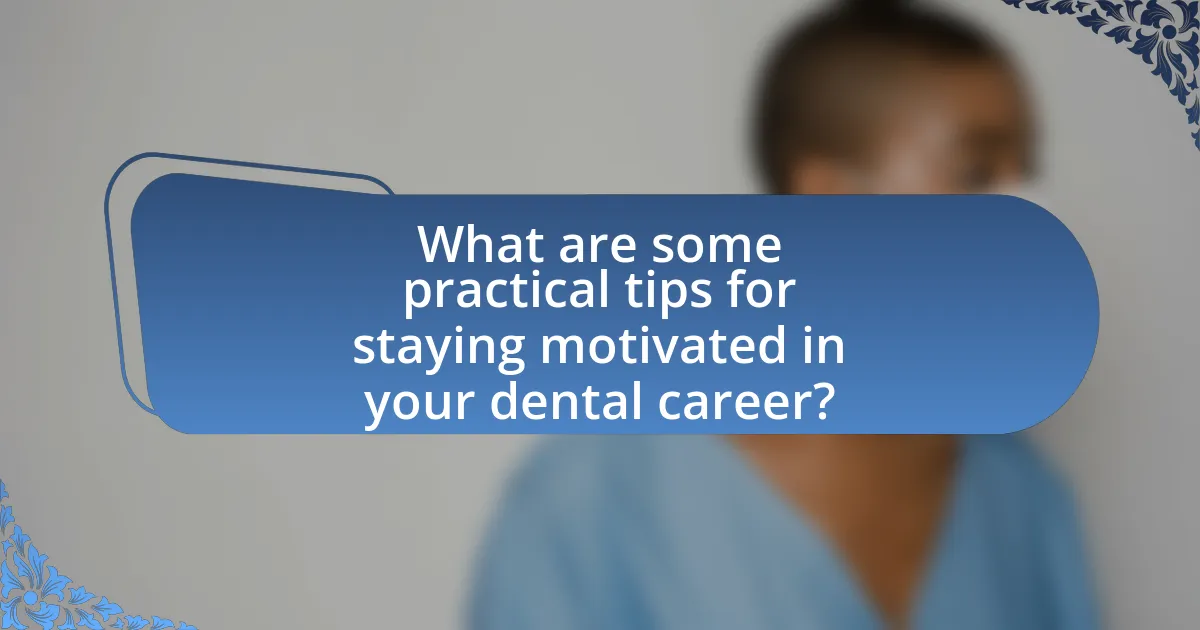
What are some practical tips for staying motivated in your dental career?
To stay motivated in your dental career, set clear, achievable goals that align with your professional aspirations. Establishing specific milestones, such as completing advanced training or expanding your practice, provides direction and a sense of accomplishment. Engaging in continuous education, such as attending workshops or conferences, enhances your skills and keeps you informed about industry advancements, which can reignite your passion for dentistry. Additionally, building a supportive network of colleagues fosters collaboration and encouragement, helping to maintain enthusiasm. Research indicates that professionals who engage in peer support and mentorship report higher job satisfaction and motivation levels.
How can daily routines influence motivation levels?
Daily routines significantly influence motivation levels by establishing structure and predictability, which can enhance focus and reduce anxiety. When individuals engage in consistent daily habits, such as setting specific work hours, prioritizing tasks, and incorporating breaks, they create an environment conducive to productivity. Research indicates that structured routines can lead to improved time management and goal achievement, as evidenced by a study published in the Journal of Applied Psychology, which found that individuals with well-defined routines reported higher levels of motivation and job satisfaction. This correlation suggests that daily routines not only help in maintaining a steady workflow but also foster a sense of accomplishment, thereby boosting overall motivation in professional settings, including dental careers.
What specific habits can dental professionals adopt to enhance motivation?
Dental professionals can enhance motivation by setting clear, achievable goals and engaging in continuous education. Establishing specific, measurable objectives provides direction and a sense of accomplishment as they are met. Continuous education, such as attending workshops or pursuing advanced certifications, keeps dental professionals updated on industry advancements and fosters a growth mindset. Research indicates that professionals who engage in lifelong learning report higher job satisfaction and motivation levels, as they feel more competent and confident in their skills.
How can mindfulness practices contribute to sustained motivation?
Mindfulness practices contribute to sustained motivation by enhancing focus, reducing stress, and fostering a positive mindset. These practices, such as meditation and deep breathing, help individuals in the dental career maintain clarity and presence, which are essential for effective patient care and professional growth. Research indicates that mindfulness can lead to increased emotional regulation and resilience, allowing dental professionals to navigate challenges more effectively. A study published in the Journal of Occupational Health Psychology found that mindfulness training improved job satisfaction and reduced burnout among healthcare workers, demonstrating its effectiveness in maintaining motivation over time.
What resources are available for dental professionals seeking motivation?
Dental professionals seeking motivation can access various resources, including professional organizations, online courses, mentorship programs, and motivational literature. Organizations such as the American Dental Association (ADA) provide networking opportunities and resources that foster professional growth. Online platforms like Coursera and Udemy offer courses focused on personal development and stress management tailored for dental practitioners. Mentorship programs connect less experienced dentists with seasoned professionals, providing guidance and encouragement. Additionally, books and articles on motivation and career development, such as “The 7 Habits of Highly Effective People” by Stephen Covey, offer strategies for maintaining enthusiasm and focus in one’s career. These resources collectively support dental professionals in enhancing their motivation and career satisfaction.
What books or podcasts can inspire dental professionals?
Books that can inspire dental professionals include “The Dental Practice Survival Guide” by Dr. Michael J. Dottore, which offers practical strategies for managing a dental practice effectively, and “The Art of Dentistry” by Dr. John C. Kois, focusing on the integration of art and science in dental care. Podcasts such as “The Dentalpreneur Podcast” hosted by Dr. Mark Costes provide insights into business strategies and personal development tailored for dental professionals, while “The Thriving Dentist Show” hosted by Gary Takacs discusses innovative ideas and motivational topics relevant to the dental field. These resources are recognized for their ability to enhance both professional skills and personal motivation within the dental community.
How can mentorship programs support motivation in dentistry?
Mentorship programs can significantly enhance motivation in dentistry by providing guidance, support, and a sense of community. These programs connect less experienced dental professionals with seasoned mentors who share valuable insights and experiences, fostering a culture of learning and growth. Research indicates that mentorship can lead to increased job satisfaction and professional development, as evidenced by a study published in the Journal of Dental Education, which found that mentees reported higher levels of motivation and engagement in their careers. This structured support system not only helps individuals navigate challenges but also instills confidence, ultimately driving them to pursue their goals in the dental field.
